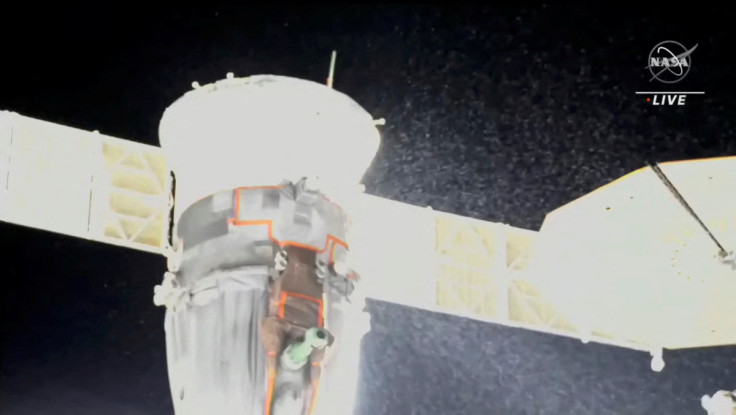Russia Detects Hole In Soyuz But In 'No Hurry' To Decide On Damaged Spacecraft
KEY POINTS
- Inspection revealed an 0.8-millimeter hole in the Soyuz spacecraft
- The temperatures inside the spacecraft are now stabilized
- A decision on what to do will be made toward the end of the month
Roscosmos, Russia's space agency, has detected the hole behind the leak that canceled a recent spacewalk aboard the International Space Station (ISS). The agency, however, is in "no hurry" to make a decision on the issue.
Cosmonauts Sergey Prokopyev and Dmitri Petelin were getting ready for a spacewalk on Dec. 14 when a stream of snowflake-like particles spewing from the Soyuz spacecraft revealed the leak. The spacewalk ended up getting canceled, and early reports suggested that the coolant leak may have been caused by a micrometeorite strike on the radiator.
A thorough investigation confirmed the presence of a 0.8-millimeter hole that likely caused the leak, Roscosmos Head Yury Borisov said Monday, according to Russian news agency TASS. Borisov described the situation to be "not very pleasant" but denied the reports that the temperature inside the spacecraft had risen to more than 50 degrees Celsius.
Indeed, reports from Roscosmos stated that the temperatures had already stabilized.
"In the first days after the leak, the tests of the systems revealed that the temperature reached plus 30 degrees Celsius in the Soyuz MS-22 spacecraft's habitation module and plus 40 degrees Celsius in its instrumentation/equipment compartment," Roscosmos said, as per the news agency. "However, in the last few days, as the spaceship's systems were switched off, the temperature in its compartments stabilized at plus 30 degrees Celsius."
NASA, in its Monday update, also stated that temperatures and humidity in the spacecraft were still "within acceptable limits," an evaluation that Roscosmos echoed.
Despite the confirmation of the presence of the hole, however, Borisov said that "there is no hurry" to make decisions, according to a separate report from TASS. Instead, two working groups have already been appointed to deal with the matter, and the decision is expected to be made next week, by Dec. 27.
It appears that the Russian agency has two possible options.
"If the situation is under control and we are fully confident in the spaceship's working capacity, it will be used for the crew's standard descent as was planned in March," Borisov added.
So far, additional tests on the Soyuz systems revealed that there were "no additional issues," NASA noted.
However, the Roscosmos could also send a backup spacecraft to bring its crew back home to Earth. This backup spacecraft is already undergoing tests at the Baikonur spaceport.

© Copyright IBTimes 2025. All rights reserved.






















